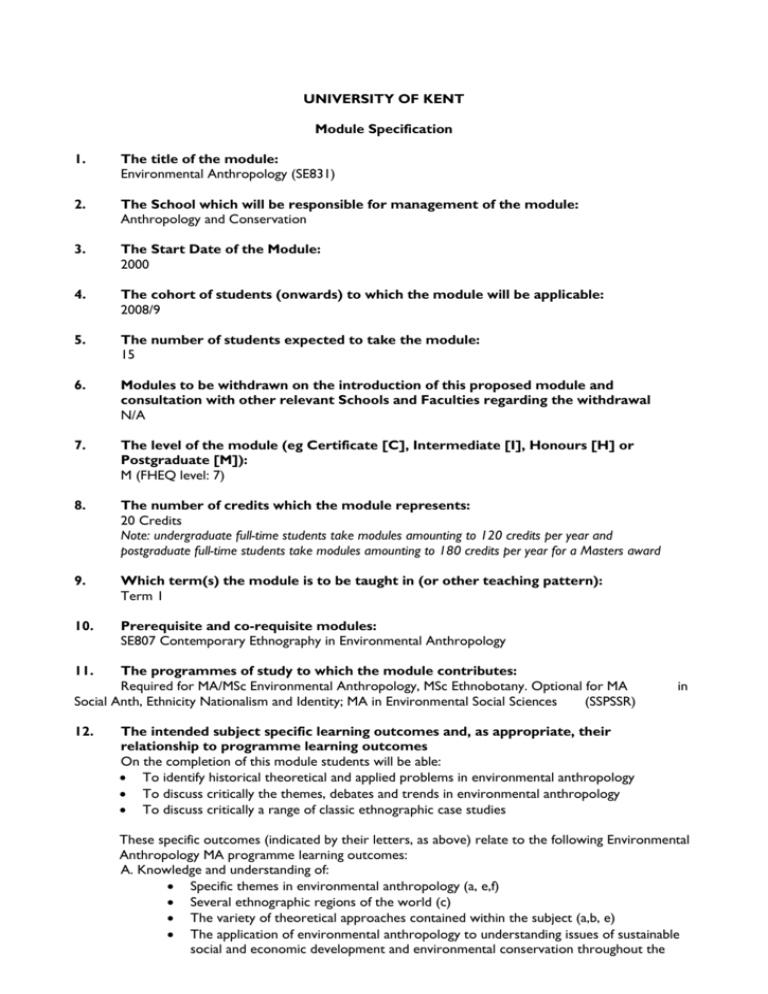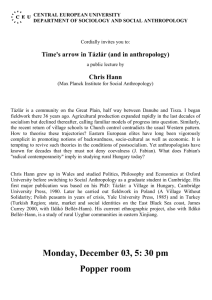University of Kent at Canterbury
advertisement

UNIVERSITY OF KENT Module Specification 1. The title of the module: Environmental Anthropology (SE831) 2. The School which will be responsible for management of the module: Anthropology and Conservation 3. The Start Date of the Module: 2000 4. The cohort of students (onwards) to which the module will be applicable: 2008/9 5. The number of students expected to take the module: 15 6. Modules to be withdrawn on the introduction of this proposed module and consultation with other relevant Schools and Faculties regarding the withdrawal N/A 7. The level of the module (eg Certificate [C], Intermediate [I], Honours [H] or Postgraduate [M]): M (FHEQ level: 7) 8. The number of credits which the module represents: 20 Credits Note: undergraduate full-time students take modules amounting to 120 credits per year and postgraduate full-time students take modules amounting to 180 credits per year for a Masters award 9. Which term(s) the module is to be taught in (or other teaching pattern): Term 1 10. Prerequisite and co-requisite modules: SE807 Contemporary Ethnography in Environmental Anthropology 11. The programmes of study to which the module contributes: Required for MA/MSc Environmental Anthropology, MSc Ethnobotany. Optional for MA Social Anth, Ethnicity Nationalism and Identity; MA in Environmental Social Sciences (SSPSSR) 12. in The intended subject specific learning outcomes and, as appropriate, their relationship to programme learning outcomes On the completion of this module students will be able: To identify historical theoretical and applied problems in environmental anthropology To discuss critically the themes, debates and trends in environmental anthropology To discuss critically a range of classic ethnographic case studies These specific outcomes (indicated by their letters, as above) relate to the following Environmental Anthropology MA programme learning outcomes: A. Knowledge and understanding of: Specific themes in environmental anthropology (a, e,f) Several ethnographic regions of the world (c) The variety of theoretical approaches contained within the subject (a,b, e) The application of environmental anthropology to understanding issues of sustainable social and economic development and environmental conservation throughout the world (a) The relevance of environmental anthropology to understanding everyday processes of human-environment interaction anywhere in the world (c, d, e) B. Intellectual Skills: Critical and analytical skills (b,d,e,f) Ability to express ideas in writing and orally (b,c,d,e) Communication skills (b,d) Group Work Skills (b,d,g) Ability to review and summarize information (d) C. Subject Specific Skills Ability to recognise the pertinence of an environmental anthropological perspective to understanding major national and international events. (a) Ability to interpret texts and performance by locating them within appropriate cultural and historical contexts. (b,d,e) High level ability to identify and analyse the significance of the social and cultural contexts of natural resource use. (a,c) 13. The intended generic learning outcomes and, as appropriate, their relationship to programme learning outcomes The anticipated Environmental Anthropology MA generic outcomes are that students on the completion of this module will be able: To appraise the value of substantive findings in environmental anthropology. To compare and contrast different theoretical approaches to the understanding of human-environment relationships To discuss abstract arguments at a high level of sophistication with their peers. These generic learning outcomes are related to the Environmental Anthropology programme learning outcomes in 12 above. 14. A synopsis of the curriculum This module introduces some of the main theoretical approaches and some practical applications of the study of environmental anthropology (in particular, the cultural ecology of Steward, the concepts of carrying capacity and limiting factors as used in eco-systematic models, historical and political ecology, and new approaches deriving from post-modern anthropology). It considers some of the main cultural and social aspects of the human-environment interface, such as the relationship between social organisation and ecology; alternative forms of land use and management; the impact of processes of globalization on human interactions with the environment in a number of nonwestern societies; and the cultural dimension of human adaptation to the environment. The middle section of the module looks at five categories of subsistence strategy and the environments they occur in, foraging and hunting (in arid, arctic and tropical forest ecosystems), fishing (coastal marine environments), pastoralism (in grassland and arid ecosystems), low intensity and high intensity agriculture (in arid, grassland and tropical environments). For each of these production systems we will also examine a complementary contemporary issue in conservation and/or development. These issues may involve great debates in theory, problems of methodology or issues in applying research results to solve practical problems. Throughout the module we address methods and problems of applying research in environmental anthropology to related development, conservation and human rights issues, and in particular this year we look at adaptation to climate change among Indigenous peoples. Week 1 Week 2 Week 3 Week 4 Theory and Explanation in Environmental Anthropology: Wildlife Trade Human-Nature Relationships: Cultural Ecology Ecological Anthropology: Complex Adaptive Systems Historical Ecology: The evolution of Biocultural diversity? Week 5 Political Ecology and Environmental Degradation Week 6 Discursive Approaches: Environmentalisms Week 7 Foraging societies, hunters, and the bushmeat trade Week 8 Fishers, Sea Tenure, and Common Property Rights Week 9 Pastoralists, Grasslands and Protected Areas Week 10 Low Intensity Agricultural Systems: Swidden Systems Week 11 High Intensity Agricultural Systems, the Green Revolution and GM crops Week 12 Climate Change: Studying local knowledge and responses 15. Indicative Reading List Bates, D. G., 2001. Human Adaptive Strategies: Ecology, Culture and Politics, Boston, MA: Allyn and Bacon. Crumley, C., ed. 2001. New Directions in Anthropology and Environment. Altamira Press. Dove, M.R and Carpenter, C. 2007. Environmental Anthropology: A Reader. Routledge. Ellen, R. F. 1982. Environment, Subsistence and System. The Ecology of Small-Scale Social Formations. Cambridge. Hardesty, D.L. 1977. Ecological Anthropology. New York: John Wiley And Sons. Moran, E.F. 2000. Human Adaptability. 2nd Edition. Boulder, CO: Westview Press. Moran, E.F. 2006. People and Nature: An introduction to human ecological relations. Blackwell. Sutton, Mark and Eugene Anderson, 2004. Introduction to Cultural Ecology. Berg. Townsend, P., 2001. Environmental anthropology. From Pigs to Policies. Waveland Press. 16. Learning and Teaching Methods, including the nature and number of contact hours and the total study hours which will be expected of students, and how these relate to achievement of the intended learning outcomes The total contact hours are 24. There will 12 two hour seminars. Masters level students are expected to dedicate an additional 176 study hours to the module (200 hours total). 17. Assessment methods and how these relate to testing achievement of the intended learning outcomes Assessment is by one 2500 word essay testing reading and comprehension of themes and historical trends in Environmental Anthropology. The Essay will test learning outcomes a, b, c, d directly and e, f, and g indirectly, and particularly how well students have understood the theoretical issues and applications of historical and contemporary environmental anthropology/ 18. Implications for learning resources, including staff, library, IT and space Given the small numbers expected to register for this module there are no major implications for learning resources for this module. The library has been asked to ensure that they have copies of the required texts. 19. A statement confirming that, as far as can be reasonably anticipated, the curriculum, learning and teaching methods and forms of assessment do not present any non-justifiable disadvantage to students with disabilities No disadvantages for students with disabilities are anticipated in relation to the curriculum, learning teaching methods and forms of assessment in this module. Statement by the Director of Learning and Teaching: "I confirm I have been consulted on the above module proposal and have given advice on the correct procedures and required content of module proposals" ................................................................ Director of Learning and Teaching ………………………………………………… Print Name .............................................. Date Statement by the Head of School: "I confirm that the School has approved the introduction of the module and, where the module is proposed by School staff, will be responsible for its resourcing" ................................................................. Head of School ……………………………………………………. Print Name .............................................. Date








